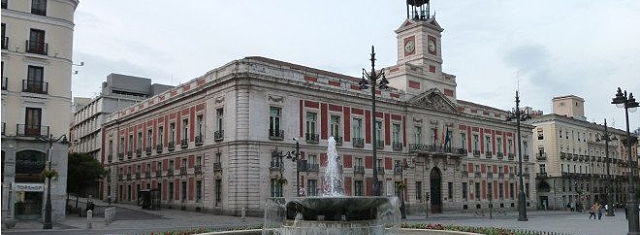Politics
Spanish Government decrees the state of alarm in the Madrid region
With the opposition of Madrid

Headquarter of the government of Madrid (Source: Rosana Rivera)
USPA NEWS -
The confrontation between the Spanish socialist Government and the conservative regional government of Madrid reached a new level this Friday, when the Government of Prime Minister Pedro Sanchez decreed a state of alarm throughout the Madrid region, for 15 days, with the frontal opposition of Madrid regional authorities. Although, officially, both governments continue to dialogue about the best way to end the coronavirus pandemic, the meetings end without agreement everytime as in a dialogue of the deaf.
The Spanish Government considers that the figures of new infections and deaths from coronavirus in Madrid are very worrying. For months it has had her sights set on the Madrid authorities and on its president, Isabel Diaz Ayuso - of the conservative Popular Party -, against whom the left has launched a smear campaign that some analysts interpret as an electoral key. The figures contradict the Spanish Government, since Navarra and La Rioja, for example, in the North of Spain, present worse figures than Madrid. But the capital is an appetizing candy that the Socialist Party wants to recover.
And that the Government of the Socialist Prime Minister Pedro Sanchez uses an internal key to show everyone that he is in charge in Spain. Two days ago, the Superior Court of Justice of Madrid overturned a law of the central Government to confine the Madrid region on the perimeter, arguing that said law did not have sufficient authority to take away from Madrid their constitutional right to free movement of people. This is the reason why, after the failure of the meeting held by both administrations on Thursday night, this Friday an extraordinary Council of Ministers was summoned to decree the state of alarm in the Madrid region.
From the entry into force of the state of alarm, Madrid residents will not be able to leave their municipalities of residence, except to work or study, go to health centers or due to force majeure. Unlike the national confinement that was decreed between March and June, this time Madrilenians will be able to walk freely through the streets of their municipalities and will be able to work, shop and meet - no more than six people -, maintaining the obligation to wear a mask and keep the interpersonal safety distance of two meters. The bars and restaurants will remain open, although with only 50% of their capacity, and must close at 22:00. The state of alarm will last 15 days, although it can be extended if the containment objectives of the pandemic that are sought are not achieved.
The approval of the state of alarm in the Council of Ministers was communicated by telephone by President Pedro Sanchez to the regional president of Madrid, Isabel Díaz Ayuso, just when the regional government councilor of Health presented at a press conference an alternative plan to the state of alarm, prepared by the Madrid authorities. In that plan, which was annulled, the regional government of Madrid proposed the perimeter confinement by sanitary areas. According to the Madrid councilor, this system has paid off in Madrid and he justified it with figures: in the areas where it has been applied, the number of coronavirus infections has decreased.
Liability for this article lies with the author, who also holds the copyright. Editorial content from USPA may be quoted on other websites as long as the quote comprises no more than 5% of the entire text, is marked as such and the source is named (via hyperlink).





